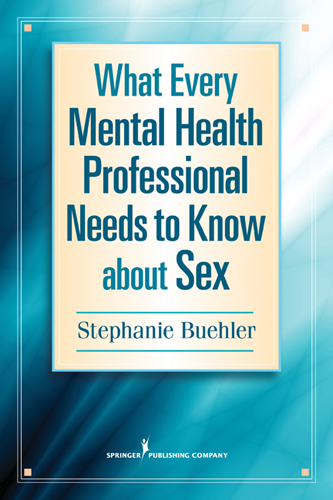 The role of sexuality in the mental health profession can be somewhat blurry for both the novice and the trained counselor. Stephanie Buehler, MPW, PsyD, and certified sex therapist skillfully tackles this issue in her book, What Every Mental Health Professional Needs to Know about Sex. She demystifies the role of sex in therapy by expanding mental health professionals’ knowledge of common sexual issues through outlining stereotypes, appropriate language, sexual anatomy, sexual health and sexual problems, as well as assessment and treatment.
The role of sexuality in the mental health profession can be somewhat blurry for both the novice and the trained counselor. Stephanie Buehler, MPW, PsyD, and certified sex therapist skillfully tackles this issue in her book, What Every Mental Health Professional Needs to Know about Sex. She demystifies the role of sex in therapy by expanding mental health professionals’ knowledge of common sexual issues through outlining stereotypes, appropriate language, sexual anatomy, sexual health and sexual problems, as well as assessment and treatment.
In Chapter 2, Buehler challenges counselors to dispute their present belief system, modifying any current rules they have about topics of sexuality within therapy. Buehler cites Ford and Hendrick’s (2003) report that counselors tend to view promiscuous clients as having more pathology, highlighting the prevalence of this conservative sexual worldview found among counselors. After bringing awareness to this issue, Buehler quickly changes gears and focuses on sexual anatomy (Chapter 3), providing scholarly terms and definitions for both sexual anatomy and the stages of psychosexual development. Next, Chapter 4 references the World Health Organization when defining sexual health as the absence of disease, dysfunction, or infertility and the presence of positive sexuality.
Buehler also identifies sexual health problems unique to both women (Chapter 6) and men (Chapter 7), since addressing potential health issues is imperative in order to further tailor treatment goals for each sex. For instance, the author provides multiple tips for helping men reduce sexual dysfunction and increase sexual health. Transitioning towards couples, she offers several sexual exploration activities to help increase intimacy and sex. Buehler’s ecosystemic approach guides professionals in assessing couples’ sexual problems (Chapter 8) in accordance with their personal development and interaction with others. Additionally, the author provides a comprehensive list of questions to help counselors assess for numerous influences on each partner’s sexuality and/or sexual-related issues. When bringing to light the emotional distance of couples, the author emphasizes, “When sex goes, love withers.”
Throughout the remainder of the book, Buehler offers insight into various populations particularly affected by sexual issues. The overarching goal of the author is to provide knowledge, increase awareness, and highlight counseling implications for these groups. Chapter 9 addresses parents’ questions about sex, providing a framework for helping parents learn to appropriately share sexual information with their children. Chapter 10 covers therapy with sexual minorities, addressing gaps in practitioners’ knowledge of special issues for LGBTQ individuals. The author believes it is necessary for clinicians to expand their knowledge of the LGBTQ community and other sexual-minority populations, because a counselor’s acceptance of his or her client is crucial for therapeutic success. Furthermore, flexibility from the counselor will also facilitate counseling sessions regarding topics like gender, age, and lifestyle preference (e.g., swinging, polyamory, etc.). In the remaining chapters, Buehler discusses other sexuality issues including sexual abuse, pain disorders, reproduction, medical problems, aging, problematic pornography viewing, and alternate sexual practices.
What Every Mental Health Professional Needs to Know about Sex provides a framework to expand upon the reader’s current knowledge of sexual issues with diverse populations. Moreover, it serves as a guide containing techniques for mental health professionals to utilize in their future work with clients.
Reviewed by: Kelley Holladay, NCC, doctoral student, University of Central Florida, Orlando, Florida.
Buehler, S. (2014). What every mental health professional needs to know about sex. New York, NY: Springer.
The Professional Counselor
